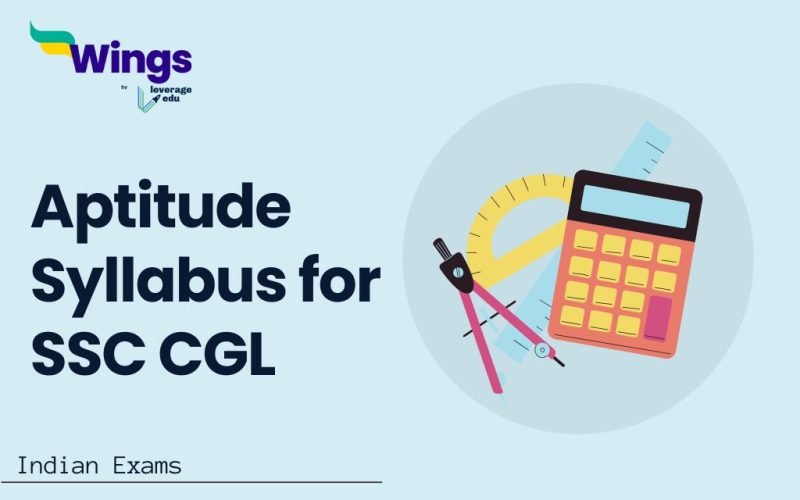Mark your calendars! The SSC CGL notification for 2024 recruitment is expected soon. While we wait for exam dates, use the SSC CGL Syllabus 2024 to align your preparation. Before knowing the complete syllabus it is advisable to know the syllabus of each of the subjects included in the SSC CGL exam. The quantitative aptitude syllabus for SSC CGL covers various mathematical topics, including arithmetic, algebra, geometry, and data interpretation. Here in this article, we have covered the entire syllabus of quantitative aptitude syllabus for SSC CGL in detail.
Table of Contents
SSC CGL Exam Pattern 2024
The SSC CGL 2024 exam consists of a single tier (Tier-1) which is qualifying in nature. This means marks scored in Tier-1 are not considered for the final merit list. Tier 1 is a computer-based test with 100 objective-type questions carrying a total of 200 marks. There is a negative marking for wrong answers, where 0.50 marks will be deducted for each incorrect answer. Candidates are given 60 minutes to complete the exam and there is no sectional time limit. This allows them to manage their time effectively between different sections. Below we have listed some of the important information related to the SSC CGL exam 2024 exam pattern:
- Exam Mode: Computer Based Test (CBT)
- Total Questions: 100
- Marks per Question: 2
- Negative Marking: 0.50 for each wrong answer (there is no negative marking for unattempted questions)
- Duration: 60 minutes
- Sectional Timing: No sectional timing, candidates can attempt questions as per their preference
By understanding the exam pattern and the selection process, candidates can rightly align their preparation and approach the exam more confidently:
| Selection Process | Four-Tier Examination |
| Tier-1 | Online |
| Tier-2 | Online |
| Tier-3 | Written Descriptive Exam |
| Tier-4 | Computer Proficiency Exam |
| Eligibility | – Indian citizenship – Bachelor’s degree in a relevant field |
| Application Fee | INR 100 (exemptions for Women, SC, ST, PwD, and ESM) |
| Age Limit | General: 18 – 32 years(Age limit varies based on the applied position) |
| Age Relaxation | Applicable for reserved categories, physically handicapped candidates, ex-Serviceman, Central Government Civilian Employees (with at least 3 years of regular service), Defense Personnel, and Jammu & Kashmir Candidates |
| SSC Official Website | www.ssc.nic.in |
SSC CGL Syllabus 2024
The Staff Selection Commission (SSC) is expected to release the official notification for the Combined Graduate Level (CGL) 2024 exam soon. This notification will include the detailed syllabus for all sections of the exam, including Quantitative Aptitude. The SSC CGL Syllabus 2024 serves as a roadmap for your preparation. By understanding the topics covered, you can build a strong foundation and strategize your study approach effectively.
Here we have listed what to expect in the SSC CGL 2024 exam:
- Quantitative Aptitude: This section typically consists of 25 questions carrying one mark each. It focuses on testing your proficiency in fundamental mathematical concepts.
- Syllabus Highlights: Expect topics like computation of whole numbers, decimals, fractions, and percentages. You’ll also see problems with ratios and proportions, square roots, averages, and basic algebra. The exam also asks questions related to l concepts like profit and loss, discounts, partnership business, time and distance, and time and work. Geometric concepts like triangles, quadrilaterals, and circles, along with basic mensuration formulas, are other important areas to focus on.
SSC CGL Syllabus for Quantitative Aptitude
Solve the problems based on LCM & HCF, Irrational or Rational Numbers. Learn the basic formulas of mensuration & then solve the problems related to Square, Rectangle, Circles, Cone, Cylinder, etc by using fast tricks of solving it. Practice problems on Bar Graphs, Pie Charts, Tables, etc..Get the details of the SSC CGL Syllabus for Quantitative Aptitude in this section.
| SSC CGL Quantitative Aptitude Syllabus 2024 | |
| Sections | Topics |
| Quantitative Aptitude Syllabus | –Percentage –Partnership Business –Time and distance –Time & Work –Mixture and Alligation –Decimals –Fractions –Quadrilaterals –Regular Polygons –Right Prism –Right Circular Cone –Interest –Sphere –Basic algebraic identities of School Algebra & Elementary surds –Profit and Loss –Discount –Relationships between numbers –Ratio and Proportion –Square roots –Computation of whole numbers –Right Circular CylinderTriangle and its various kinds of centers –Graphs of Linear Equations –Averages –Congruence and similarity of triangles –Circle and its chords, tangents, angles subtended by chords of a circle, common tangents to two or more circles –Complementary angles –Bar diagram & Pie chart –Triangle –Frequency polygon –Degree and Radian Measures –Hemispheres –Histogram –Regular Right Pyramid with triangular or square base –Trigonometric ratio –Heights and Distances –Standard Identities –Rectangular Parallelepiped |
FAQ
The syllabus for SSC CGL Tier 1 quantitative aptitude includes topics like arithmetic, algebra, geometry, trigonometry, and data interpretation.
To prepare for quantitative aptitude in SSC CGL, practice regularly, focus on understanding concepts, use study materials, and solve previous years’ question papers.
The four subjects in SSC CGL exam are quantitative aptitude, English language, general intelligence & reasoning, and general awareness.
The four subjects in SSC CGL exam are quantitative aptitude, English language, general intelligence & reasoning, and general awareness.
The syllabus of maths for SSC CGL includes arithmetic, algebra, geometry, trigonometry, mensuration, and data interpretation.
This was all about the “Aptitude Syllabus for SSC CGL”. For more such informative blogs, check out our Government Exams Section, or you can learn more about us by visiting our Indian exams page.
 One app for all your study abroad needs
One app for all your study abroad needs













